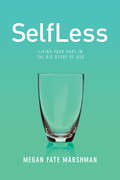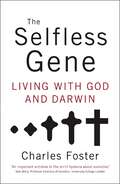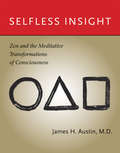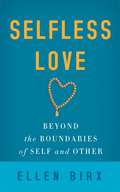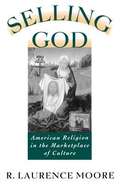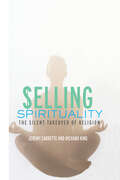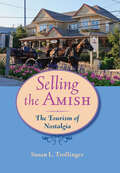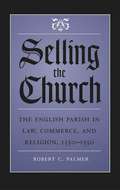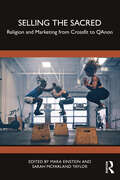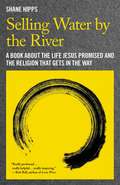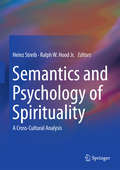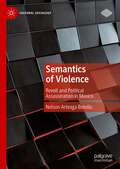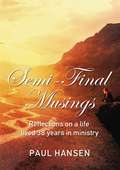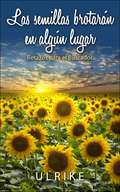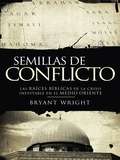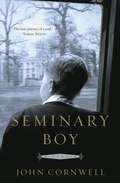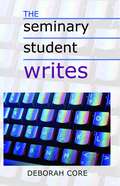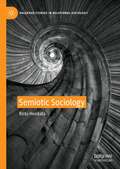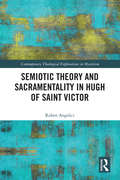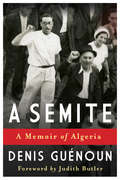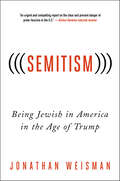- Table View
- List View
SelfLess: Living Your Part in the Big Story of God
by Megan MarshmanIn SelfLess, popular speaker Megan Fate Marshman exposes the source of self-limiting beliefs that create needless striving to be good enough and points to powerful truths that can transform life into a new experience of freedom, joy, and love. People desire to be significant; however, ironically amidst a self-help and “find-me” culture, they become their own greatest obstacles. Significance cannot be created through self or found by desperately reaching for other people. An abundant life, joyful spirit, and the awe of touching others can only be found by allowing God to fill hearts to overflowing. By moving over and giving Him everything, people discover what they really seek and join the amazing adventure of God’s wondrous story.
The Selfless Gene: Living with God and Darwin
by Charles FosterIf evolutionary theory is correct, what does that say about creator God?Ever since the famous debate on Darwinism between Huxley and Wilberforce in 1860, there has been little real conversation between the scientific community and much of the Christian world. This book offers the prospect of reconciliation between what are seen as two opposing worldviews.With remarkable insight and skill, Foster shows that most evolutionary theory and its consequences are easily reconciled with Christian orthodoxy and explores the ethical problems of natural selection in a fresh and invigorating way.Charles Foster insists on getting to the heart of the topic and succeeds through a scientific and biblical analysis that is second to none. The Selfless Gene has the potential to become required reading for theologians and laypeople alike.
Selfless Insight: Zen and the Meditative Transformations of Consciousness
by James H. AustinAttention, self-consciousness, insight, wisdom, emotional maturity: how Zen teachings can illuminate the way our brains function and vice-versa. When neurology researcher James Austin began Zen training, he found that his medical education was inadequate. During the past three decades, he has been at the cutting edge of both Zen and neuroscience, constantly discovering new examples of how these two large fields each illuminate the other. Now, in Selfless Insight, Austin arrives at a fresh synthesis, one that invokes the latest brain research to explain the basis for meditative states and clarifies what Zen awakening implies for our understanding of consciousness. Austin, author of the widely read Zen and the Brain, reminds us why Zen meditation is not only mindfully attentive but evolves to become increasingly selfless and intuitive. Meditators are gradually learning how to replace over-emotionality with calm, clear objective comprehension. In this new book, Austin discusses how meditation trains our attention, reprogramming it toward subtle forms of awareness that are more openly mindful. He explains how our maladaptive notions of self are rooted in interactive brain functions. And he describes how, after the extraordinary, deep states of kensho-satori strike off the roots of the self, a flash of transforming insight-wisdom leads toward ways of living more harmoniously and selflessly. Selfless Insight is the capstone to Austin's journey both as a creative neuroscientist and as a Zen practitioner. His quest has spanned an era of unprecedented progress in brain research and has helped define the exciting new field of contemplative neuroscience.
Selfless Love
by Ellen Jikai BirxSelfless Love shows how meditation can help us realize that we don't love--we are love.Gentle, elegant, and radically inspiring, Selfless Love presents a holistic, experiential meditative path that enables us to see beyond our preconceived notions of identity, spirituality, and humanity. Drawing equally from Zen parables, her experience as a mental health therapist, and the Gospels, Ellen Birx shows us that through meditation we can recognize that our true selves are not selves at all - that all beings are united in unbounded, infinite awareness and love, beyond words. Recognizing the limitations of language in describing the indescribable, Birx concludes each chapter in the Zen tradition of "turning words" with a verse meant to invite insights.
Selling God: American Religion in the Marketplace of Culture
by R. Laurence Moore[Back Cover] "Religion in America is up for sale. The products range from a plethora of merchandise in questionable taste--such as Bible-based diet books (More of Jesus. Less of Me), Rapture T-shirts (one features a basketball game with half its players disappearing in the Rapture--the caption is "Fast Break"), and bumper stickers and frisbees with inspirational messages--to the unabashed consumerism of Jim Bakker's Heritage USA, a grandiose Christian theme park with giant water slide, shopping mall, and office complex. We tend to think of these phenomena--which also include a long line of multimillionaire televangelists and the almost manic promotion of Christmas giving--as a fairly recent development. But as R. Laurence Moore points out in Selling God, religion has been deeply involved in our commercial culture since the beginning of the nineteenth century. In a sweeping, colorful history that spans over two centuries of American culture, Moore examines the role of religion in the marketplace, revealing how religious leaders have borrowed (and invented) commercial practices to promote religion--and how business leaders have borrowed (and invented) religion to promote commerce. It is a book peopled by a fascinating roster of American originals, including showman P.T. Barnum and painter Frederick Church, film directors D.W. Griffith and evangelist Norman Vincent Peale. Ranging from the rise of gymnasiums and "muscular Christianity," to L. Ron Hubbard's Church of Scientology, Selling God provides both fascinating social history and an insightful look at religion in America."
Selling My Soul
by Lewis Sherri L.Sex scandal rocks megachurch! Returning from a two-year mission trip in Mozambique, Trina Michaels plans to ignore the sensational headline that screams from the front page of the Washington Times. Her heart is still in Africa, the place that feels more like home than anywhere she's ever lived—and the place where the love of her life still is. Her dream of a quick return to Mozambique fades within hours when Trina discovers that her mother has been diagnosed with cancer. The cost of treatment is expensive, and Trina is forced to return to her career in public relations to pay for it. She is assigned a damage control client—the bishop whose church made headline news when an associate pastor and deacon were accused of sexually abusing young boys. To complicate matters, the young boys are now men, and one of them is married to Trina's best friend. Representing Bishop Walker could cost Trina her most valued friendship, her reputation, and a future with her new love. As she plows deeper into the scandal and the bishop blackmails her to cover the church's secrets and lies, Trina realizes it could cost her soul.
Selling My Soul
by Sherri L. LewisSex scandal rocks megachurch!Returning from a two-year mission trip in Mozambique, Trina Michaels plans to ignore the sensational headline that screams from the front page of the Washington Times. Her heart is still in Africa, the place that feels more like home than anywhere she's ever lived--and the place where the love of her life still is. Her dream of a quick return to Mozambique fades within hours when Trina discovers that her mother has been diagnosed with cancer. The cost of treatment is expensive, and Trina is forced to return to her career in public relations to pay for it.She is assigned a damage control client--the bishop whose church made headline news when an associate pastor and deacon were accused of sexually abusing young boys. To complicate matters, the young boys are now men, and one of them is married to Trina's best friend. Representing Bishop Walker could cost Trina her most valued friendship, her reputation, and a future with her new love. As she plows deeper into the scandal and the bishop blackmails her to cover the church's secrets and lies, Trina realizes it could cost her soul.
Selling Spirituality: The Silent Takeover of Religion
by Richard King Jeremy CarretteFrom Feng Shui to holistic medicine, from aromatherapy candles to yoga weekends, spirituality is big business. It promises to soothe away the angst of modern living and to offer an antidote to shallow materialism. Selling Spirituality is a short, sharp, attack on this fallacy. It shows how spirituality has in fact become a powerful commodity in the global marketplace - a cultural addiction that reflects orthodox politics, curbs self-expression and colonizes Eastern beliefs.Exposing how spirituality has today come to embody the privatization of religion in the modern West, Jeremy Carrette and Richard King reveal the people and brands who profit from this corporate hijack, and explore how spirituality can be reclaimed as a means of resistance to capitalism and its deceptions.
Selling the Amish: The Tourism of Nostalgia (Young Center Books in Anabaptist and Pietist Studies)
by Susan L. TrollingerMore than 19 million tourists flock to Amish Country each year, drawn by the opportunity to glimpse "a better time" and the quaint beauty of picturesque farmland and handcrafted quilts. What they may find, however, are elaborately themed town centers, outlet malls, or even a water park. Susan L. Trollinger explores this puzzling incongruity, showing that Amish tourism is anything but plain and simple.Selling the Amish takes readers on a virtual tour of three such tourist destinations in Ohio’s Amish Country, the world’s largest Amish settlement. Trollinger examines the visual rhetoric of these uniquely themed places—their architecture, interior decor, even their merchandise and souvenirs—and explains how these features create a setting and a story that brings tourists back year after year.This compelling story is, Trollinger argues, in part legitimized by the Amish themselves. To Americans faced with anxieties about modern life, being near the Amish way of life is comforting. The Amish seem to have escaped the rush of contemporary life, the confusion of gender relations, and the loss of ethnic heritage. While the Amish way supports the idealized experience of these tourist destinations, it also raises powerful questions. Tourists may want a life uncomplicated by technology, but would they be willing to drive around in horse-drawn buggies in order to achieve it?Trollinger's answers to important questions in her fascinating study of Amish Country tourism are sure to challenge readers’ understanding of this surprising cultural phenomenon.
Selling the Church
by Robert C. PalmerIn the years of expanding state authority following the Black Death, English common law permitted the leasing of parishes by their rectors and vicars, who then pursued interests elsewhere and left the parish in the control of lay lessees. But a series of statutes enacted by Henry VIII between 1529 and 1540 effectively reduced such clerical absenteeism. Robert Palmer examines this transformation of the English parish and argues that it was an important part of the English Reformation.Palmer analyzes an extensive set of data drawn from common law records to reveal a vigorous and effective effort by the laity to enforce the new statutes. Motivated by both economic and traditional ideals, the litigants made the commercial activities of leaseholding and buying for resale and profit the exclusive domain of the laity and acquired the power to regulate the clergy. According to Palmer, these parish-level reformations presaged and complemented other initiatives of the crown that have long been considered central to the reign of Henry VIII.
Selling the Sacred: Religion and Marketing from Crossfit to QAnon
by Mara Einstein Sarah McFarland TaylorThere’s religion in my marketing! There’s marketing in my religion! Selling the Sacred explores the religio-cultural and media implications of a two-sided phenomenon: marketing religion as a product and marketing products as religion. What do various forms of religion/marketing collaboration look like in the twenty-first century, and what does this tell us about American culture and society?Social and technological changes rapidly and continuously reframe religious and marketing landscapes. Crossfit is a “cult.” Televangelists use psychographics and data marketing. QAnon is a religion and big business. These are some of the examples highlighted in this collection, which engages themes related to capitalist narratives, issues related to gender and race, and the intersection of religion, politics, and marketing, among other key issues.The innovative contributors examine the phenomenon of selling the sacred, providing a better understanding of how marketing tactics, married with religious content, influence our thinking and everyday lives. These scholars bring to light how political, economic, and ideological agendas infuse the construction and presentation of the “sacred,” via more traditional religious institutions or consumer-product marketing. By examining religion and marketing broadly, this book offers engaging tools to recognize and unpack what gets sold as “sacred,” what’s at stake, and the consequences.A go-to resource for those working in marketing studies, religious studies, and media studies, Selling the Sacred is also a must-read for religious and marketing professionals.
Selling Water by the River: A Book about the Life Jesus Promised and the Religion That Gets in the Way
by Shane HippsWork, sex, ice cream, religion-they all promise fulfillment. But what they deliver is fleeting.Jesus knew about this quest. He came to show us that peace is possible in this life, not just the next one. Yet Christianity, the very religion that claims Jesus as its own, has often built the biggest barriers to him and the life he promised. Celebrated speaker and pastor Shane Hipps revives the faith with a fresh and persuasive understanding of the message of Jesus. The shocking truth is that Jesus proclaimed "eternal life" as a present reality that dwells within each of us. A transformative breakthrough, this book goes beyond "religion" or "spirituality" and cuts to the heart of our humanity and existence. It's about realizing that we already possess what we are searching for, and that the Heaven we long for isn't just a gift when we die, but a gift while we live. possible in this life, not just the next one. Yet Christianity, the very religion that claims Jesus as its own, has often built the biggest barriers to him and the life he promised. Celebrated speaker and pastor Shane Hipps revives the faith with a fresh and persuasive understanding of the message of Jesus. The shocking truth is that Jesus proclaimed "eternal life" as a present reality that dwells within each of us. A transformative breakthrough, this book goes beyond "religion" or "spirituality" and cuts to the heart of our humanity and existence. It's about realizing that we already possess what we are searching for, and that the Heaven we long for isn't just a gift when we die, but a gift while we live.
Semantics and Psychology of Spirituality
by Heinz Streib Ralph W. Hood Jr.This book examines what people mean when they say they are "spiritual". It looks at the semantics of "spirituality", the visibility of reasons for "spiritual" preference in biographies, in psychological dispositions, in cultural differences between Germany and the US, and in gender differences. It also examines the kind of biographical consequences that are associated with "spirituality". The book reports the results of an online-questionnaire filled out by 773 respondents in Germany and 1113 in the US, personal interviews with a selected group of more than 100 persons, and an experiment. Based on the data collected, it reports results that are relevant for a number of scientific and practical disciplines. It makes a contribution to the semantics of everyday religious language and to the cross-cultural study of religion and to many related fields as well, because "spirituality" is evaluated in relation to personality, mysticism, well-being, religious styles, generativity, attachment, biography and atheism. The book draws attention to the - new and ever changing - ways in which people give names to their ultimate concern and symbolize their experiences of transcendence.
Semantics of Violence: Revolt and Political Assassination in Mexico (Cultural Sociology)
by Nelson Arteaga BotelloThis book describes three impactful cases of political violence that broke out in Mexico in 1994, pointing to an important juncture in Mexican political development. At that point, the patrimonial order centered on the PRI and the Mexican presidency entered a momentous crisis that is still ongoing after a quarter of a century and caused the patrimonial order and the civil order to compete over Mexican public life. Such competition, in turn, unfolds at the cultural level on the terrain of three semantics of political violence that shape public debates over violence in Mexico. Ultimately, this book sheds light over the refraction of patrimonial and civil attributions across such cultural terrains.
Semi-Final Musings: Reflections on a life lived 38 years in ministry
by Paul HansenThe target audience for this volume is ministry leaders, Pastors, elders and deacons, as well as those individuals who would like to grow in their relationship with Jesus Christ. The audience will be of necessity: men and women who are either in College or Seminary and/or in ministries working in churches.
Las Semillas Brotarán En Algún Lugar... Retazos Para El Buscador
by Ulrike Maria Carolina Paula GiordanaHe estado pensando sobre el equilibrio en mis escritos durante este año de intensa actividad. Entonces revisé el manuscrito de mi nuevo e inminente libro para ver cuáles son los temas que descuidé y qué quedaba todavía por hacer.No tuve en cuenta un tema específico al escribir cada día; simplemente anoté aquello que estaba en mis pensamientos y en mi corazón, y cosas que surgían día a día. Al igual que todas las persona, debo ocuparme de mis experiencias mientras van surgiendo.Esta guía es una compilación de pensamientos, ideas y conceptos que contemplé durante este tiempo y sobre las cuales trabajé con mucho esmero para llegar a una comprensión clara de cada uno. Quiero compartir estas semillas de pensamientos contigo para que así puedan brotar en tierras fértiles. Aliméntalas bien, ¡cambiarán tu vida!Deja que tus pensamientos angelicales estén siempre contigo.
Semillas de conflicto
by Bryant WrightUn claro y profundo análisis bíblico del origen, la historia y la importancia del conflicto de Medio Oriente.El actual conflicto en el Medio Oriente comenzó mucho tiempo antes de la creación del Estado de Israel en 1948: se originó cuando Abraham pecó y torció la promesa de Dios de que él y sus herederos construirían una gran nación y heredarían el territorio hoy llamado la «tierra prometida».Semillas de conflicto, un relato histórico y político, ofrece una explicación clara de la historia bíblica de Abraham, Sara y Agar y de la consiguiente rivalidad fraternal entre Jacob y Esaú, cuyas decisiones dieron origen a las tres religiones más influyentes del mundo: el judaísmo, el cristianismo y el islamismo.Este fascinante análisis sobre los inicios del conflicto también explica la razón por la que este territorio es tan importante en nuestros días. Además, Wright echa luz sobre las incompatibles perspectivas cristiana, judía e islámica sobre el conflicto y responde a la pregunta ¿Dios tiene favoritismos?
Seminary Boy
by John CornwellOne of the most extraordinary memoirs of recent years, the acclaimed writer John Cornwell has finally written his own story, and the story of a choice he had to make between the Church and a life lived outside its confines. John Cornwell decided to become a priest at the age of thirteen, a strange choice perhaps for a boy who'd been sent to a 'convalescent home' for having whacked a nun about the head. Growing up in a chaotic household, sharing two rooms with his brothers and sisters, his hot-headed mother and - when he was around - absconding father, John spent his time roaming the war-torn streets of London looking for trouble. One day, at his mother's suggestion, he responded to a call from his local parish priest for altar servers. The 'dance of the rituals', the murmur of Latin and the candlelit dawn took hold of his imagination and provided him with a new and unexpected comfort. He left post-war London for Cotton, a seminary in the West Midlands. In this hidden, all-male world, with its rhythms of devotion and prayer, John grew up caught between his religious feelings and the rough and tumble of his life back in London; between seeking the face of God in the wild countryside around him and experiencing his first kiss; between monitoring his soul and watching a girl from a moving train whose face he will never forget. Cornwell tells us of a world now vanished: of the colourful community of priests in charge; of the boys and their intense and sometimes passionate friendships; of the hovering threat of abuse in this cloistered environment. And he tells us of his struggle to come to terms with a shameful secret from his London childhood - a vicious sexual attack which haunts his time at Cotton. A book of tremendous warmth and humour, 'Seminary Boy' is about an adolescent's search for a father and for a home.
The Seminary Rule: An Explanation of the Purposes Behind It and How Best to Carry It Out
by Fr. Thomas Dubay Joseph Francis RummelAn explanation of the purposes behind the Seminary Rule and how best to carry it out
The Seminary Student Writes
by Deborah CoreDeborah Core offers practical guidance for beginning seminary students who feel overwhelmed and under-prepared to write the number and quality of papers their courses require. The book begins with reflections on writing as a sacred action, then addresses such practical matters as choosing and researching a topic; outlining, drafting, and polishing a paper; and using the proper format for footnotes and bibliography. Also included are sample papers in MLA and Chicago styles and an overview of grammar and usage.
Semiotic Sociology (Palgrave Studies in Relational Sociology)
by Risto HeiskalaSemiotic Sociology provides solid ground for cultural analysis in the social sciences by building up a mediation between structuralist semiology (Saussure), pragmatist semiotics (Peirce), and phenomenological sociology (Schutz, Garfinkel, Berger and Luckmann). This is a deviation from the common view that these traditions are seen as mutually exclusive alternatives and thus competitors of each other. The net result of the synthesis is that a new social theory emerges wherein action theories (Weber and rational choice) are based on phenomenological sociology and phenomenological sociology is based on neostructuralist semiotics, which is a synthesis of the Saussurean and the Peircean traditions of understanding habits of interpretation and interaction. The core issues of social research are then addressed on these grounds. The topics covered include the economy/society relationship, power, gender, modernity, institutionalization, the canon of current social theory including micro/macro and agency/structure relations, and the grounds of social criticism.
Semiotic Theory and Sacramentality in Hugh of Saint Victor (Contemporary Theological Explorations in Mysticism)
by Ruben AngeliciThis book offers Hugh of Saint Victor’s early scholastic thoughts on sacrament in order to re-discover the pre-modern theological understanding of ontological signification. The Christian understanding of sacrament through the category of ‘signs’ results in a theology that inherently shares in the philosophical notion of semiotics. Yet, through the advent of post-structuralism, current sign-theory is effectively shaped by post-Kantian, ontological foundations. This can lead to misinterpretations of the sacramental theology that predates this intellectual turn. The book works within a context of Christological, realist mysticism. Such an approach allows mutually informing debates in semiotic development and studies on sacramental theology to sit side-by-side. In addition, as a work of ressourcement, influenced by the methodology and concerns of the historical, French Ressourcement, this study seeks to continue an engagement with some of the most promising sacramental positions that have emerged throughout twentieth-century theology, particularly with the revival of interest in Victorine theology. By providing an examination of sacramentality and theories of signification in the early scholastic theology of Hugh of Saint Victor, this book gives fresh impetus to the theology surrounding sacrament. As such, it will be of great interest to scholars of mysticism, theologians of sacrament, philosophical theologians, and philosophers of religion.
A Semite: A Memoir of Algeria
by Denis GuenounIn this vivid memoir, Denis Guénoun excavates his family's past and progressively fills out a portrait of an imposing, enigmatic father. René Guénoun was a teacher and a pioneer, and his secret support for Algerian independence was just one of the many things he did not discuss with his teenaged son. To be Algerian, pro-independence, a French citizen, a Jew, and a Communist were not, to René's mind, dissonant allegiances. He believed Jews and Arabs were bound by an authentic fraternity and could only realize a free future together. René Guénoun called himself a Semite, a word that he felt united Jewish and Arab worlds and best reflected a shared origin. He also believed that Algerians had the same political rights as Frenchmen. Although his Jewish family was rooted in Algeria, he inherited French citizenship and revered the principles of the French Revolution. He taught science in a French lycée in Oran and belonged to the French Communist Party. His steadfast belief in liberty, equality, and fraternity led him into trouble, including prison and exile, yet his failures as an activist never shook his faith in a rational, generous future.René Guénoun was drafted to defend Vichy France's colonies in the Middle East during World War II. At the same time, Vichy barred him and his wife from teaching because they were Jewish. When the British conquered Syria, he was sent home to Oran, and in 1943, after the Allies captured Algeria, he joined the Free French Army and fought in Europe. After the war, both parents did their best to reconcile militant unionism and clandestine party activity with the demands of work and family. The Guénouns had little interest in Israel and considered themselves at home in Algeria; yet because he supported Algerian independence, René Guénoun outraged his French neighbors and was expelled from Algeria by the French paramilitary Organisation Armée Secrète. He spent his final years in Marseille. Gracefully weaving together youthful memories with research into his father's life and times, Denis Guénoun re-creates an Algerian past that proved lovely, intellectually provocative, and dangerous.
(((Semitism))): Being Jewish in America in the Age of Trump
by Jonathan WeismanIn the wake of Donald Trump's election and the Pittsburgh synagogue massacre, (((Semitism))) is a powerful book that examines how we can fight anti-Semitism in AmericaA San Francisco Chronicle Reader RecommendationThe Washington Post: "Timely...[A] passionate call to arms."Jewish Book Council: "Could not be more important or timely."Bernard-Henri Lévy: "It would be wonderful if anti-Semitism was a European specialty and stopped at the border with the United States. Alas, this is not the case. Jonathan Weisman’s new book (((Semitism))) shows why..."Michael Eric Dyson: "With eloquence and poignancy Weisman shows how hatred can slowly and quietly chew away at the moral fabric of society. We now live in an age where more than ever bigotry and oppression no longer need to hide in fear of reproach. The floodgates have opened. This is much more than a personal response to the bigotry he experienced because of his Jewishness; Weisman has written a manifesto that outlines the dangers of marginalizing and demonizing all minority groups. This powerful book is for all of us." Anti-Semitism has always been present in American culture, but with the rise of the Alt Right and an uptick of threats to Jewish communities since Trump took office, including the the Pittsburgh synagogue massacre, New York Times editor Jonathan Weisman has produced a book that could not be more important or timely. When Weisman was attacked on Twitter by a wave of neo-Nazis and anti-Semites, witnessing tropes such as the Jew as a leftist anarchist; as a rapacious, Wall Street profiteer; and as a money-bags financier orchestrating war for Israel, he stopped to wonder: How has the Jewish experience changed, especially under a leader like Donald Trump?In (((Semitism))), Weisman explores the disconnect between his own sense of Jewish identity and the expectations of his detractors and supporters. He delves into the rise of the Alt Right, their roots in older anti-Semitic organizations, the odd ancientness of their grievances—cloaked as they are in contemporary, techy hipsterism—and their aims—to spread hate in a palatable way through a political structure that has so suddenly become tolerant of their views.He concludes with what we should do next, realizing that vicious as it is, anti-Semitism must be seen through the lens of more pressing threats. He proposes a unification of American Judaism around the defense of self and of others even more vulnerable: the undocumented immigrants, refugees, Muslim Americans, and black activists who have been directly targeted, not just by the tolerated Alt Right, but by the Trump White House itself.
Señales, Maravillas y Milagros
by Dr Pensacola H JeffersonSEÑALES, MARAVILLAS Y MILAGROS fueron escritos para ayudar a una persona a ver los que da por sentado. A menudo queremos que Dios se PRUEBE a sí mismo a través de señales, prodigios y milagros, pero no nos damos cuenta, si somos verdaderamente SALVOS, YA hemos experimentado el MILAGRO más grande de todos; Jesucristo. Jesús es la SEÑAL y su Espíritu Santo que mora en nosotros es la MARAVILLA. LA VIDA ETERNA es el MILAGRO supremo. No hiciste nada para ganar, merecer o ser digno de recibir ninguno de estos dones espirituales. Si tienes la salvación, el Espíritu Santo que mora en ti y la vida eterna, ¿quién te dio estas cosas? La biblia dice que no vinieron de ti ni de ningún otro ser humano, sino que TODOS son dones sobrenaturales de Dios. Si son REGALOS de Dios son MILAGROS. MILAGROS que se han vuelto tan comunes que nos volvemos complacientes con ellos.
